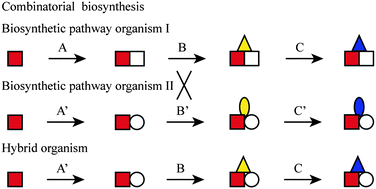Combinatorial biosynthesis in plants: A (p)review on its potential and future exploitation
Abstract
Covering: 2003 to 2011
Combinatorial biochemistry, also called combinatorial

* Corresponding authors
a
Department of Plant Systems Biology, VIB, Technologiepark 927, Gent, Belgium
E-mail:
alain.goossens@psb.vib-ugent.be
Fax: +32 9 3313809
Tel: +32 9 3313800
b Department of Plant Biotechnology and Bioinformatics, Ghent University, Gent, Belgium
c Department of Molecular Microbiology, VIB, Leuven, Belgium
d Laboratory of Molecular Cell Biology, Institute of Botany and Microbiology, Katholieke Universiteit Leuven, Leuven, Belgium
Covering: 2003 to 2011
Combinatorial biochemistry, also called combinatorial

 Please wait while we load your content...
Something went wrong. Try again?
Please wait while we load your content...
Something went wrong. Try again?
J. Pollier, T. Moses and A. Goossens, Nat. Prod. Rep., 2011, 28, 1897 DOI: 10.1039/C1NP00049G
To request permission to reproduce material from this article, please go to the Copyright Clearance Center request page.
If you are an author contributing to an RSC publication, you do not need to request permission provided correct acknowledgement is given.
If you are the author of this article, you do not need to request permission to reproduce figures and diagrams provided correct acknowledgement is given. If you want to reproduce the whole article in a third-party publication (excluding your thesis/dissertation for which permission is not required) please go to the Copyright Clearance Center request page.
Read more about how to correctly acknowledge RSC content.
 Fetching data from CrossRef.
Fetching data from CrossRef.
This may take some time to load.
Loading related content
